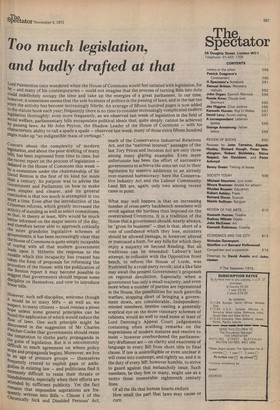Too much legislation,
and badly drafted at that
Lord Palmerston once wondered when the House of Commons would feel satiated with legislation; for — and many of his contemporaries — could not imagine that the process of turning Bills into Acts Could indefinitely occupy the time and take up the energies of a great parliament. In our time, however, it sometimes seems that the sole business of politics is the passing of laws, and in the last ten Years the activity has become increasingly febrile. An average of fifteen hundred pages is now added to the statute book each Year; frequently there is no time to consider increasingly complicated modern legislation thoroughly; even more frequently, as we observed last week of legislation in the field of social welfare, parliamentary bills encapsulate political ideals that, quite simply, cannot be achieved 13Y passing laws. As Mr John Peyton, the Shadow Leader of the House of Commons — with his Characteristic ability to call a spade a spade — observed last week, many of those extra fifteen hundred Pages make up "an indigestible mass of verbiage."
Concern about the complexity of modern legislation, and about the poor drafting of many bills, has been expressed from time to time, but the recent report on the process of legislation — debated in the House of Commons this week — by a committee under the chairmanship of Sir bavid Renton is the first of its kind for more than a century. Its purpose was to advise the Government and Parliament on how to make laws simpler and clearer, and its general conclusion is that too much is attempted in too short a time Even after the introduction of the Crossrnan reforms, which greatly increased the activity of standing as well as select committees, so that, in theory at least, MPs would be much better informed on the major issues of the day, and therefore better able to approach critically the more grandoise legislative schemes of governments, it has been increasingly clear that the House of Commons is quite simply incapable of coping with all that modern government loads upon it. Hitherto the response to the inUddle which this incapacity has created has taken the form of proposals for reforming the Procedure of the House: with the publication of the Renton report it may become possible to suggest that governments should impose some discipline on themselves, and vow to introduce fewer bills.
H. owever, such self-discipline, welcome though it would be to many MPs — as well as, we LsusPect, to many citizens — must remian a pious none unless some general principles can be found the application of which would reduce the flOw of laws. One such principle might be Aiscovered in the suggestion of Mr Charles Pletcher -Cooke that governments should resist the temptation to clothe party propaganda in he guise of legislation. But it is uncommonly difficult to reach agreement on where policy ,atolis and propaganda begins. Moreover, we live ln an age of pressure groups — themselves fre9uently created to exploit gaps or ambiguities in existing law — and politicians find It extremely difficult to resist their threats or blandishments, especially when their efforts are attended by sufficient publicity. Yet the fact reMains that impossible aspirations are frequently written into Bills — Clause 1 of the Chronically Sick and Disabled Persons' Act, much of the Conservative Industrial Relations Act, and the "national interest" passages of the last Tory Prices and Incomes Act are only three among many glaring examples. Even more unfortunate has been the effort of successive governments to achieve the aims set out in their legislation by massive additions to an already over-manned bureaucracy: here the Conservative Industry Act and the Labour Community Land Bill are, again, only two among recent cases in point.
What may well happen is that an increasing number of cross-party backbench members will revolt against the burdens thus imposed on the overstrained Commons. It is a tradition of the House that a government should, nearly always, be "given its business" — that is that, short of a vote of confidence which they lose, ministers should be allowed passage, in however altered or truncated a form, for any bills for which they enjoy a majority on Second Reading. But all traditions can be amended: Labour's last attempt, in collusion with the Opposition front bench, to reform the House of Lords, was frustrated by a cross-party revolt; and a like fate may await the present Government's proposals on regional devolution. Especially when a government has only a small majority, and even more when a number of parties are represented in the House, the possibilities for such guerrilla warfare, stopping short of bringing a government down, are considerable. Independentminded members, besides casting a generally sceptical eye on the more visionary schemes of cabinets, would do well to read some at least of Lord Denning's Appeal Court judgements containing often scathing remarks on the imprecisions of modern statutes and resolve to insist — however overburdened the parliamentary draftsmen are — on clarity and exactness of language in every Bill from short title to final clause. If law is unintelligible or even unclear it will come into contempt, and rightly so, and it is the duty of every MP, however humble, to strive to guard against that melancholy issue. Such members, be they few or many, might use as a motto those memorable eighteenth century lines: Of all the ills that human hearts endure How small the part that laws may cause or cure.
































 Previous page
Previous page